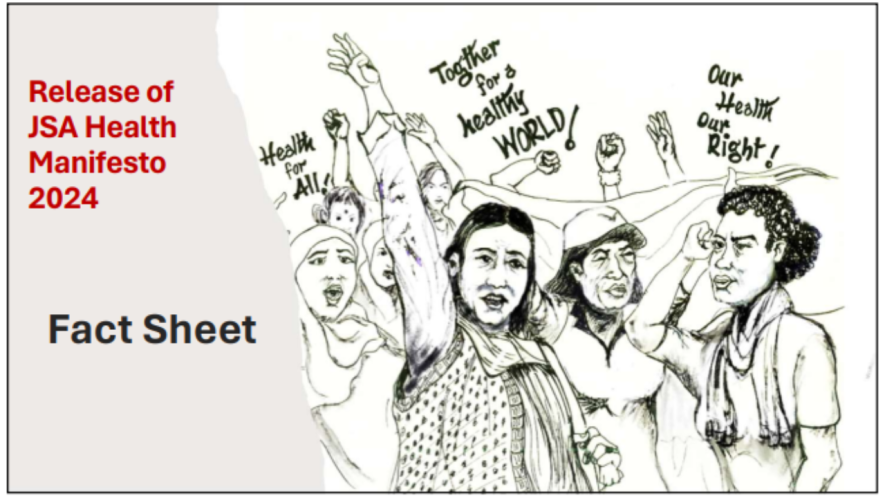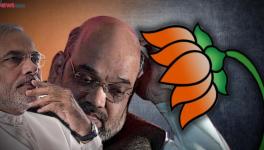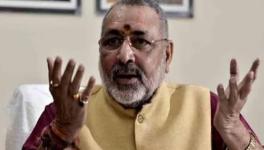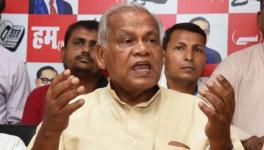Rebuild Health System, Instead of Renaming Centres: Jan Swasthya Abhiyan’s People’s Manifesto

New Delhi: As political parties finalise candidates and the campaign for the 2024 Lok Sabha elections kick-off, the Jan Swasthya Abhiyan (JSA), a people’s health movement, has come out with a People’s Health Manifesto, calling for a common health system for ALL.
Releasing the People’s Health Manifesto on Thursday, JSA has called for
The JSA, a coalition of health activists, experts and public health organisations, has flagged 18 points to put in place a strong, inclusive and efficient public health system in the country.
Titled “Our Health Our Right”, the manifesto points out that India’s per capita expenditure was dismal at $25, compared with a country like Thailand that spends $256, which is 10 times higher, China $363, (15 times higher) and Sri Lanka $77, which is three times higher.
“After the Covid-19 experience, it was expected that the government will prioritise health and increase spending in the sector. However, it is unfortunate that the Union Government has reduced spending on health from 0.37% in 2020-21 to 0.29% in 2024-25,” it said.
JSA also noted that India also fares “badly” in terms of out-of-pocket expenditure.
“More than half the money spent on health comes from patients and their families” it says and has suggested various policy proposals to improve access to free and quality healthcare by all.
Some key highlights of the manifesto are:
Right to Healthcare Legislation: Enactment of Right to Healthcare legislation at State level, supported by making Healthcare a fundamental right at National level to guarantee the availability of free quality treatment for all conditions in close proximity to individuals' residences.
Increase Budgetary Allocation for Health: Increase in health spending to 3.5% of GDP, with a special emphasis on raising the central government's allocation to 1% of GDP. States must receive special financial envelopes from the Central government to enhance health expenditure.
Reduce Out-of-Pocket Spending: JSA has proposed spending on health to less than 25% of total health expenditure, to alleviate financial hardships faced by individuals seeking healthcare services.
Justice to Health Workers: The manifesto emphasises the importance of filling vacant posts in health facilities and ensuring justice for health workers by regularising all scheme-based and contractual staff. It calls for adequate wages and protection under labour laws.
Devolution of Administrative and Financial Powers: The manifesto advocates for devolving administrative and financial powers to local bodies and state governments to enable them to manage health systems effectively in their jurisdictions.
Secularism and Inclusivity: The people’s health manifesto calls for the immediate reversal of rebranding Health and Wellness Centres as 'Arogya Mandirs', aligning with constitutional values of secularism and inclusivity.
Availability of Essential Drugs and Diagnostics: The importance of ensuring affordable and quality essential drugs and diagnostics can be achieved through effective implementation of rational price control measures. Many states in India provide a good model to do so and that should be scaled up to the entire country with active support from the central government.
Reverse privatisation: The manifesto advocates phasing out government-funded health insurance schemes including PMJAY and public-private partnerships, emphasising the primary responsibility of the government in healthcare provision.
Regulation of Private Healthcare Sector: JSA has called for effective implementation of an improved Clinical Establishment Act and regulation of rates and grievance redressal systems for patients in the private healthcare sector. Similarly, commercialisation of medical education should be reversed.
The manifesto also proposes reviewing and reforming the National Medical Commission and National Eligibility cum Entrance Test (NEET) to prevent the commercialisation of medical education.
Speaking on the launch of the Health Manifesto, Richa Chintan, national co-convener of JSA, said, “Our Health Manifesto embodies our collective vision for a healthier and more equitable India. We urge political parties and policymakers to prioritise these recommendations to ensure the right to health for every individual,” as per a statement released by JSA.
Sarojini N. of JSA said: “Government should regularise ASHA, ANM and anganwadi workers and provide them proper wages. Maternity and benefits across populations should be ensured.”
Emphasising the importance of access to quality medicines, Harishankar Singh of Delhi Network of Positive People (DNP+) said: “Access to affordable and quality essential drugs and diagnostics is non-negotiable. Implementing effective price control measures, returning to cost-based pricing, and ensuring availability of medicines as per the NLEM 2022 are critical steps towards achieving equitable healthcare for all.”
Ravi Duggal, public health researcher and activist said, “A public-centered system for universal healthcare is the cornerstone of a just society. We envision a future where healthcare is a common system that provides for the health needs of all residents of India, irrespective of their socio-economic status.”
Get the latest reports & analysis with people's perspective on Protests, movements & deep analytical videos, discussions of the current affairs in your Telegram app. Subscribe to NewsClick's Telegram channel & get Real-Time updates on stories, as they get published on our website.
























